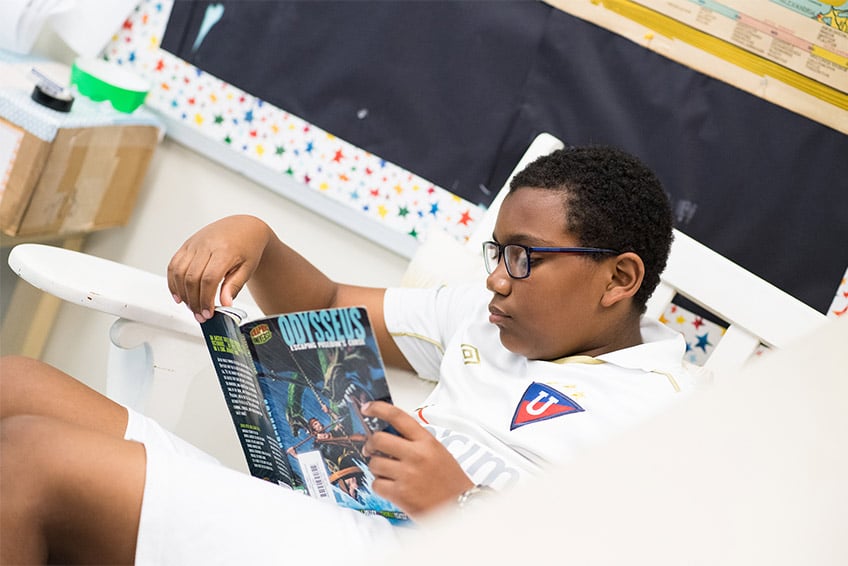
Many students look forward to the summer as a time when they are free of classes, homework, and early mornings. But even though your child might not actively be engaged in the classroom doesn’t mean that they can’t be learning throughout the summer.
Summer reading programs are one way that students across the country can continue to learn and grow even when school’s out. Below, we take a look at the importance of summer reading programs and offer a number of tips that you can use to make sure your child is getting as much value as possible out of their summer reading.
Importance of Summer Reading
By some estimates, the average child loses one month of overall learning over the course of their summer vacation—and two months of reading skills, specifically. This is a phenomena known as summer learning loss, and in practical terms it means that schools spend an average of six weeks each fall reteaching old material to get students back up to speed after summer break.
Free Downloadable Guide: Take a Closer Look at Friends' Central School
Summer reading is one tool that we use to keep students’ minds active and engaged in learning even when they are not in the classroom. This allows us to put our classroom time to better use come fall, and ultimately ensures that our students are constantly growing instead of falling behind.
Summer Reading Tips for Parents
1. Build it into the schedule.
One common trap that many students fall into is waiting until the last weeks of summer break to complete their summer reading assignments. This is flawed for a couple of reasons.
First, the point of summer reading is to keep a student’s mind engaged throughout the entirety of the summer. By putting it off until the very end of break, they miss out on the benefits that summer reading is meant to instill. Second, it adds unnecessary stress to what is really not meant to be a stressful process.
By building summer reading into your child’s schedule, you can help them avoid this stress and realize the benefits of summer reading. This can even help your child develop a love of reading that they can carry with them throughout their lives. As little as thirty minutes to an hour a day is likely more than enough to meet the requirements of your child’s summer reading program.
2. Don’t be afraid to think outside the lines.
All schools will have their own minimum requirements for summer reading, which parents and students should of course defer to. A school may, for instance, require that a student read a certain number of books from a list of approved reading. But these requirements are just that—a minimum. So long as your child meets the expectations of the school, you should feel free and, in fact, empowered to encourage your child to go beyond those minimum requirements and read more.
In these instances, parents shouldn’t be afraid to think outside of the lines of what is typically considered “classic” reading. There are thousands of worthwhile books from authors of all cultures and backgrounds—many of which are often underrepresented in curricula—that your child can benefit from reading.
Parents interested in broadening their child’s bookshelf can see Friends’ Central’s summer reading lists here, broken out by grade level, and consider incorporating some of these books into their child’s reading plan.
3. Make it a family affair.
For younger children—especially those in nursery, preschool, and kindergarten—reading is more likely than not to be a part of family time, where reading takes place together. Reading together helps young children not only develop their vocabulary and reading skills, but also serves as an important bonding time for most families.
But older children, too, can benefit from approaching summer reading as a family. While you might not read to your middle or your high schooler, you can read “with” them by reading the same books and then taking the time to discuss them together—much as students do with their teachers in the classroom. In addition to giving parents of older children an opportunity to bond and connect, discussions also help to reinforce the key themes and ideas of the literature.
4. Consider a theme.
Does your child’s summer reading program give them the flexibility to choose a number of books from a list of approved reading materials? If your child asks for your guidance or advice in choosing books from their summer reading list, consider encouraging them to choose books which share a common theme. Doing so can help them to better retain information and details about the books.
This doesn’t mean, however, that everything they read needs to be communicating the same idea. While books might explore the same theme, they can do so in dramatically different ways, and even communicate different ideas in doing so. After your child has read the books, you can discuss the similarities and differences between them to ensure that your child is making the connections.
At Friends’ Central, we strongly believe in the power of thematic education and the way that it can be used to unify diverse subject matter to create a depth of interest and understanding often absent in traditional approaches to curriculum, and use it to shape both our curriculum and summer reading assignments.
5. Keep it interesting.
One way to keep summer reading interesting for your child is to encourage them to read a wide variety of materials. If one of the books they have chosen to read, for example, is a novel, you might encourage that the next be a collection of short stories, a book of poetry, nonfiction, or even a play.
Especially when paired with the thematic approach mentioned above, incorporating a variety of mediums into your child’s summer reading list can be an incredibly effective way of exploring complicated topics from a range of viewpoints.
Helping Your Child Make the Most of Summer Reading
Summer reading is an opportunity for students to stay engaged in the learning process even when they are not in the classroom or learning alongside their peers. While the onus is, ultimately, on the student to complete the assignments that are given to them, parents can leverage the advice and tips above to help their children get as much value as possible out of the experience.



